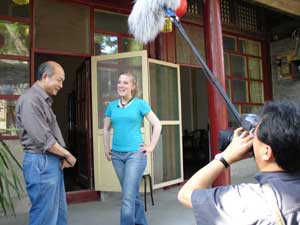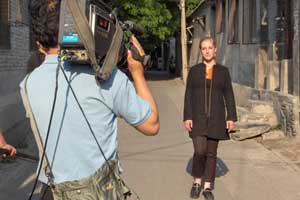Comments on 鈥淲andering in Hutong鈥�
cctv.com 10-15-2005 17:57
|

|
|
|
To me, the most fascinating interview we did for this show was with a team of real estate developers who specialize in tearing down original hutong in order to build brand-spanking-new courtyards in a 鈥渢raditional鈥�style. For this group, I was mainly interested in asking the features that make Beijing鈥檚 hutong unique: was it the mendui, the white drumstones on either side of the front door that indicate rank and position? Was it the range of motif that is used to decorate the eaves? And what features are truly Beijing, as opposed to Chinese in general? Alas, my questions were only to be answered in part. As a foreigner interviewing a company that specialized in razing and remaking hutong, I had unknowingly touched a very sensitive nerve. The movement to protect remaining hutong is seen, by some people, as primarily foreign-based, and therefore, largely illegitimate. But first, to help you picture the scene of the interview, a description: the director, cameraman, sound specialist, technical assistant and I were sitting in a U-shape with the 鈥減rofessors鈥�(as they called themselves) who doubled as upper management for the real estate company. If their diamond watches, rings, and gold chain pendants were any indication, this was a mighty profitable enterprise that they were running, and these were the most blinged-out professors I had ever seen.
|

|
|
|
Before I asked my first question, and sometime after I was introduced as the host of the show, the head professor told me that foreigners would never understand the issue of preservation of hutong. So much for brown-nosing, this guy was cutting to the chase! He said that Westerners valued historical preservation because our architecture was stone- and concrete-based, and therefore built to last, whereas Chinese people have always preferred living materials like wood, even though they decay over time. I was fascinated by his assumptions. Knowing nothing about my thoughts or the thoughts of the Chinese film crew I was with, he made statements like 鈥測ou [meaning me, and presumably other non-Chinese] think all hutong should be protected.鈥�(I don鈥檛.) And, 鈥渨e [meaning himself and the Chinese crew with me] think that idea is absurd.鈥�(The crew doesn鈥檛. Many Chinese people don鈥檛.) His words and his body language indicated that he assumed the Chinese crew would automatically agree with everything he said; they simply did not. I make this point because I often hear visitors come to Beijing and lament, 鈥渢hey just don鈥檛 care about preserving their own history.鈥�If 鈥榯hey鈥�refers to all Beijing residents, that statement is far from accurate.
The course of our interview gave me invaluable insight into the nature of the battle to protect Beijing鈥檚 oldest homes: at its root, as far as I can see, it is a difference in value systems. From the head professor鈥檚 standpoint, to use the metaphor he used, when teeth rot and are no longer aesthetically appealing, it is perfectly natural to pull the original tooth and replace it with a gold tooth 鈥�which is prettier than the first tooth would have ever been. The prettier tooth serves the function of the older tooth but it doesn鈥檛 rot, it doesn鈥檛 cause its wearer pain, and it even shines in the light! Where is there even a question about whether or not to replace it? Perhaps to show that he does, contrary to appearances, value history, he made the further point that he opposed the construction of high-rise apartments in the spaces where hutong once were. As he said, Beijing鈥檚 city development is not limited by the barriers like mountains, oceans, or neighboring developments that some other megacities face, so high-rises could always be built on the city鈥檚 outskirts. Because Beijing鈥檚 downtown has historically been one-story, he feels it should stay one-story. But when modern conveniences like central air and heating, wireless internet, and alarm systems were not cost-effective to install because of structural limitations, it was time to rebuild with a structure more conducive to modernity. Starting from scratch also yields other benefits: namely, he contended, waterproofed wood that can soundly last up to three hundred years. (The professor further cited this example by saying later that hutong were never meant to last more than sixty years or so, as the wood used in the originals was not waterproofed, and therefore bound to deteriorate.) He also offered that his company鈥檚 new-and-improved structures offered greater resistance to natural disasters, as the foundations he built were 鈥渕uch deeper鈥�than many of the originals. (The most common depth for the foundation of originals was 30 centimeters. Onsite of one of his current developments, the company鈥檚 representative later said that their standard foundation was 50-60 centimeters deep.)